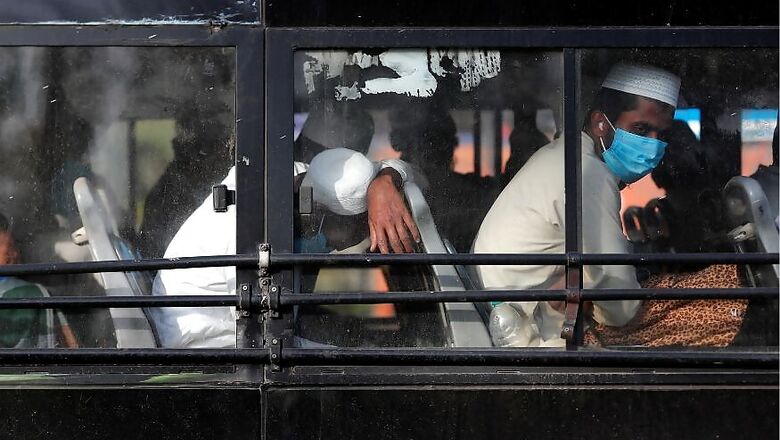
views
New Delhi: The headquarters of a religious sect in Delhi’s Nizamuddin area, which has developed into one of the biggest coronavirus disease (Covid-19) hot spots in India, was on Tuesday sealed and 800 people moved out in buses were quarantined in different parts of the city as several more positive cases with links to the gathering held here in mid-March emerged.
In Delhi, 24 people out of the 102 tested for the virus after being taken to the Lok Nayak Hospital have been found positive so far, while reports of nearly another 200 taken to two other hospitals is still awaited. Another 11 who had attended the gathering of Tabligh-e-Jamaat were found infected in Andhra Pradesh, the state government said on Tuesday, while one patient was a close contact of a person who attended the meet.
"A grave crime has been committed," Delhi health minister Satyendar Jain said. The Delhi government has accused the organisation of “gross negligence” and said it plans to lodge an FIR against the mosque’s maulana, who denied wrongdoing and said in a statement that no lockdown regulations were violated.
AAP MLA Atishi sought strong action against the Nizamuddin Markaz authorities and asked why the Delhi Police did not take any step despite the government prohibiting such gathering to check the spread of the virus.
So far, nine people with links to the event at the mosque have died across the country – six in Telangana, one in Srinagar, one in Mumbai and one in Tumkuru in Karnataka.
The Telangana administration is estimating over 1,000 people from the state might have attended the congregation, a senior official said, adding search is on to identify people who came in contact with them.
Of the six people in Telangana, two died in Gandhi Hospital, one each in Apollo Hospital, Global Hospital, in Nizamabad and in Gadwal. A cleric at the event had died in Srinagar last week. He had also visited the Deoband seminary in Uttar Pradesh and on his return to Kashmir, held multiple gatherings.
The links to the deaths in Mumbai and Karnataka emerged on Tuesday as the full scale of the cluster outbreak of coronavirus became a little clearer.
A 65-year-old Philippines national who died in Mumbai due to Covid-19 on March 22 had attended the congregation along with a group of 10, and three people in the group have also tested positive. The group also stayed at a mosque in Navi Mumbai and the maulana of that mosque has also been infected, along with his son, grandson and domestic help. Many people the priest came in contact with have been quarantined.
The death in Karnataka’s Tumkuru was a 60-year-old who travelled to Delhi by train on March 13. He died at Tumkuru’s designated hospital for Covid-19 patients on March 27. The authorities have traced 24 high risk primary contacts, of which 13 are isolated at the designated hospital, eight have tested negative and three are health care professionals who are house quarantined.
In addition to these cases, nine attendees and the wife of one of them have also tested positive in the Andaman and Nicobar islands, accounting for all 10 cases there. The gathering has also been linked to cases in Uttar Pradesh and Tamil Nadu.
South Korea-like Surveillance, Testing Planned
The government, comparing the situation to what unfolded in South Korea, said similar massive surveillance and testing will be initiated around the cluster formed here to control the spread. While the spread in South Korea was caused by a mysterious Shincheonji Church of Jesus, here it is related to a religious congregation.
A single "super-spreader" known as "patient 31" - a member of a fringe church called Shincheonji – had caused a rapid rise in cases in South Korea. The outbreak has centered on Daegu, a city of about 2.5 million in the country’s southeast, after a 61-year-old Shincheonji congregant — known as Patient No. 31 — is believed to have infected many other worshipers during services.
The Korea Centers for Disease Control and Prevention had reported that around 60 per cent of all confirmed cases in the country were “related to Shincheonji.”
Over 300 foreign nationals had attended the event in Nizamuddin, including 72 from Indonesia, 71 from Thailand, 19 from Nepal, 20 from Malaysia, 33 from Mynamar, 34 from Sri Lanka, 19 from Bangladesh and 28 rfom Kyrgyzstan.
The first indications of the site being a source of the disease came in last week when officials in four regions – Andaman, Telangana, Tamil Nadu and Kashmir – began tracing the travel histories of patients who tested positive there.
Till now, the most serious instances of the disease spread in India have been in large local clusters -- such as in Rajasthan’s Bhilwara, Maharashtra’s Sangli and in Punjab’s Banga. The patients linked to the Delhi mosque have fanned out across the country, in some instances infecting locals, raising the spectre of having triggered community transmission.
Mosque Denies Wrongdoing, Govt Rejects Defence
The Nizamuddin mosque’s administration, on Tuesday, however, dismissed reports that quarantine protocols were not practiced and said that it had tried to comply with the lockdown rules but a large group of visitors were stuck at the markaz (centre) as the government suspended all passenger train operations across the country.
It also said that the organisation had requested the concerned Sub-Divisional Magistrate to issue vehicle passes so that the stranded guests can go back home, but the permission is yet to be granted.
The building belongs to the Tablighi Jamaat, an evangelical Muslim sect that hosted this month its annual congregation with attendees coming in from several foreign nations such as Indonesia and Malaysia before they spread out to other parts of the country. While around 1,500 attendees left the congregation, over 1,000 people continued to stay at the Tablighi Jamaat’s Markaj even as a 21-day nationwide lockdown was imposed on March 24.
The Delhi government has rejected the clarification, saying that on March 13, it had ordered that there cannot be any gathering of over 200 people and this was further reduced to 50 people on March 16.
It said that a March 12 order also stated that anyone with a travel history from COVID-19 affected countries have to self-isolate, but this too was not implemented by the mosque administration.
Moreover, notification by Delhi Govt on 12th March stated that anyone with a travel history from COVID-19 affected countries have to self-isolate, then why did the administrators of the Markaz not ensure isolation of residents coming from those countries? pic.twitter.com/zqd8lzAPOC — Atishi (@AtishiAAP) March 31, 2020
Tagging a Delhi government order which prohibited assembly of over 200 people, Atishi sought strong action against the administrators of the Nizamuddin Markaz (centre).
The Kalkaji MLA in a tweet said, "Moreover, notification by Delhi government on March 12 stated that anyone with a travel history from COVID-19 affected countries have to self-isolate, then why did the administrators of the Markaz not ensure isolation of residents coming from those countries?"
"What action did Delhi Police take against the large religious gathering at the Nizamuddin Markaz from March 13-15, when there were orders from Delhi Govt prohibiting gatherings of more than 200 people? Strong action needs to be taken by MHA against concerned police officers," she asked.
In another tweet, she said tagged a screenshot to show the distance between Nizamuddin police station and the Nizamuddin Markaz.
"The Hazrat Nizamuddin police station is right next to Nizamuddin Markaz, as can be seen on Google maps. Why did Delhi Police not take action against Markaz administration when 1000s of people gathered from March 13-15, in violation of Delhi government orders?" she said in the caption accompanying the tweet.
The Markaz said that after Prime Minister Narendra Modi called for a ‘Janata curfew’ on March 22, the ongoing programme was discontinued. However, as railways suspended its operations, it had to accommodate the stranded guests.
The organisation also added that a Tehsildaar along with a medical team visited the Markaz on March 25 to examine the visitors, and added that all medical regulations were followed.
“During this entire episode, Markaz Nizamuddin never violated any provision of law, and always tried to act with compassion and reason towards the visitors who came to Delhi from different states. It did not let them violate the medical guidelines by thronging ISBTs or roaming on streets,” it said, further offering its premises as a quarantine facility.



















Comments
0 comment